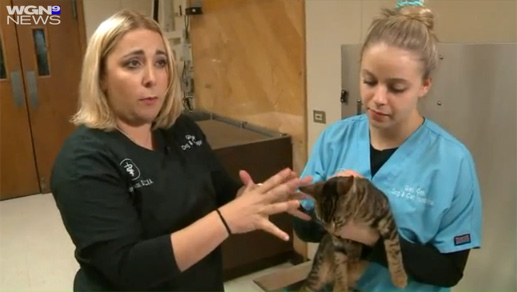
Our very own Dr. Ashley Rossman was featured on WGN news recently! Dr. Rossman discusses the best way to help your dog beat the winter blues and keep them safe. Watch the spot in the video below:
Highlights from the video include the following:
It’s only a matter of time! We bundle up to brave the elements – but our pets need extra protection, as well. When temps dip below freezing, don’t leave animals outside for longer than a quick trip to go to the bathroom.
“Dogs can easily get frostbite very quickly.” Veterinarian Dr Ashley Rossman says, take a close look to see the signs.
Dr Rossman: “You’re going to look at the pads. And in between the pads you see how it’s pink. Sometimes it will turn gray, and it will crack.”
Check the nose for dryness and cracking … then the ears.
Dr Rossman: “The tips of the ears they get white. There can be hair loss, cracking, that gray color and just very painful.”
If frostbite takes hold …
Dr Rossman: “They’re probably going to need antibiotics. They may need supportive care, IV fluids. In very severe cases they may need skin grafts.”
For pets left outside, hypothermia can lead to listless behavior — a sign of a more serious condition.
Dr Rossman: “Hypoglycemia is low blood sugar, which happens a lot with hypothermia.”
A blast of an over-the-counter sugar supplement on the nose may do the trick.
Dr Rossman: “You can put a little bit on their nose, and she’s going to lick right away. I don’t think this will solve all the problems, but this will help stabilize them a little bit until you get veterinary care.”
It melts the ice but it heats up their paws — salt that’s not pet friendly irritates the skin.
Dr Rossman: “You really want to wipe off their pads as soon as they come in. It burns the skin and it can cause necrosis and it’s stinging pain to the animals.”
A topical gel creates a barrier protectant.
Dr Rossman: “You put it right on the bottom of their paws before you go outside.”
Or try booties – if your dog will tolerate the feel and look
Dr Rossman: “They keep the paws warm and dry.”
And just as fish oils help humans – they do the same for pets, particularly when it comes to protecting their coat and skin from the cold, dry air.
Dr Rossman: “It’s very important to get a good quality product. Ask your vet what product they would recommend.”
There are lots of feral cat colonies in the city. Dr Rossman says heated water bowls and a well-insulated shelter are essential. Check with your local humane society or rescue organization – many sell the items for a reasonable cost.

